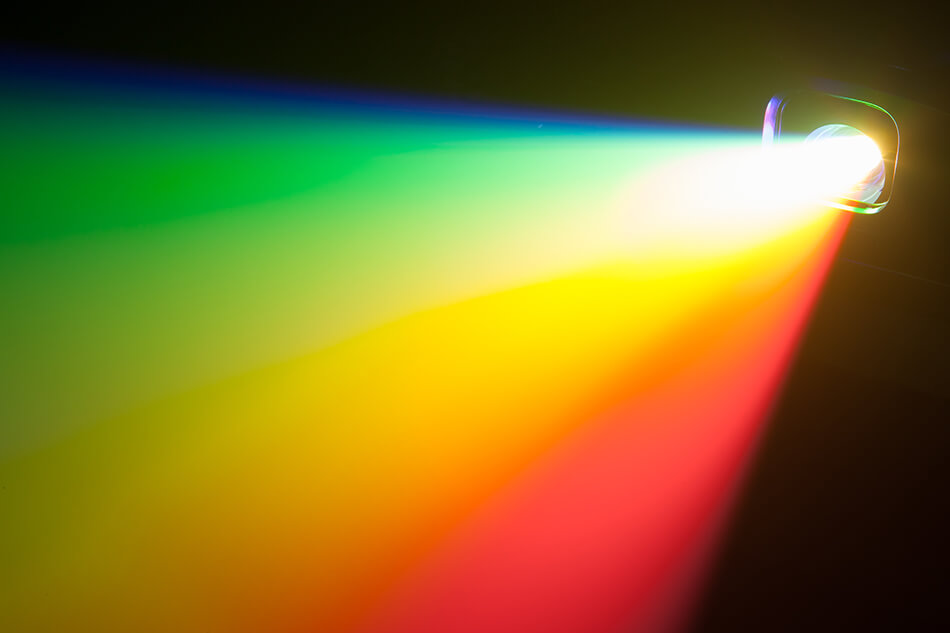Is Eye Protection for Blue Light Really Necessary?

Blue light blocking computer glasses are one of the latest health-related trends in eyewear. It seems there's always something new to be on the lookout for. The list of potential dangers we need to monitor, or lifestyle changes we need to make, regarding our health is forever growing.
But what is blue light and is it dangerous? Can the blue light emitted from our digital devices really damage our eyes? Read on as we explore whether eye protection for blue light is really necessary.
What is Blue Light?
Light is made up of a graduated spectrum of color. When red, orange, yellow, green, blue, indigo and violet light combine, they make white light or sunlight. Each color in the spectrum has a different wavelength and quantity of energy. Light on the red end of the spectrum has longer rays and a lesser amount of energy. Light on the blue end of the spectrum has shorter rays and a higher amount of energy.
At the farthest end of the color spectrum, beyond red light, there is infrared light. This light is most commonly used in warming lamps that emit infrared radiation. At the other end of the spectrum, beyond violet light, is ultraviolet light. These high energy electromagnetic rays are also known as UV radiation.

Most of the blue light we are exposed to comes from the sun. Blue light is also present in fluorescent light, LED light (including LED televisions), computer monitors, smartphones and tablet screens. The amount of blue light emitted from these light-emitting devices is negligible compared to that which comes from the sun.
However, eye care professionals have raised concern over the increasing amount of time we spend exposed to screens. According to a CNN report, the average American spends about 10 hours per day in front of a screen. The light from screens is absorbed by the eye at a much closer proximity than that absorbed from the sun. Concern has also been raised over how children’s eyes react to blue light from digital device screens. So, do you need to worry?
Is Blue Light Bad for Your Eyes?
The negative impact of ultraviolet light on the eyes is well-documented. UV light has more energy than blue light but is largely absorbed by the cornea and lens at the front of the eye. By comparison, visible blue light can reach the retina where it is absorbed by the retinal pigment epithelium (RPE) and can potentially cause damage.
Blue light may affect vision and prematurely age the eyes, although research using adults has produced mixed results. It has been shown that blue light exposure has a greater effect on children than adults. However, no definitive link has been made between exposure to blue light emitted from our screens and damage to retinal cells.
The most damaging effect blue light from screens has on our eyes is thought to be digital eye strain and disruption of the body’s natural circadian rhythm. The symptoms of digital eye strain are dry eyes, fatigue, and headaches. These symptoms are caused by the decreased contrast of screens and our tendency to blink less when we use them. Our circadian rhythm is also known as our daily sleep-wake cycle. Blue light stimulates the eyes and the brain and too much exposure to blue light at night can make it harder to get to sleep.

Protect Your Eyes Against Blue Light
Sunglasses
The best way to protect your eyes from blue light when you’re outdoors is to invest in a good pair of sunglasses. To be truly effective against the sun’s harmful rays, your sunglasses should filter at least 99% of UV rays and feature an anti-reflective coating. Lenses with an anti-reflective coating reduce glare and increase contrast, making it easier to see when the sun is at its brightest. Anti-reflective coatings can also block the blue light coming from both the sun and your screens.
Eyecare professionals also recommend photochromic lenses. Sometimes referred to as transition lenses, most photochromic lenses are activated by both UV and visible blue light. Because UV and blue light can reach the eyes through clouds, photochromic lenses will darken on overcast days. These lenses are convenient because they will adjust to different light conditions as you move between indoors and outdoors and they shield the eyes from the sun’s UV rays.
Certain contact lenses now contain photochromic technology.Acuvue Oasys lenses are now available with built-in transitions technology that adapts to changing light conditions and reduces exposure to blue light and UV rays. However, these lenses are not a substitute for UV-absorbing eyewear.
Protect Your Eyes from the Computer Screen
Computer Glasses
Computer glasses reduce your exposure to blue light when looking at screens for long periods of time. Computer glasses are available with and without a corrective prescription. If you wear contact lenses, you can wear computer eye glasses with zero power over your lenses. Computer glasses can also be optimized to match the distance from which you usually look at your monitor.

However, the American Academy of Ophthalmology does not recommend any special eyewear for computer use. If you have glasses to treat myopia, you should, of course, wear them, but specially-designed “computer glasses” that claim to filter blue light are unnecessary. The AOA advises that symptoms of digital eye strain are caused by how we use our screens, not anything the screen is emitting. Practice the following good computer habits and your digital eye strain should subside.
- Take regular breaks. Use the 20-20-20 rule to take a break every 20 minutes and focus on an object 20 feet away for at least 20 seconds.
- View your screen from arm’s length.
- Position your screen so that you’re gazing down at it.
- Apply a blue-light blocking screen filter to your computer, laptop or tablet, especially if your children use your devices frequently.
- Make the room brighter and the contrast on your screen higher.
- If you wear contact lenses and your eyes feel dry, remove the lenses and wear your glasses. If this is a recurring problem, consider switching to daily disposable lenses with a high moisture content. Lenses like Focus Dailies Aqua Comfort Plus can be more comfortable if you spend a lot of time looking at screens.
Intraocular Lens
Cataracts are one of the negative impacts aging has on the eyes, but there are also benefits to aging. As our eyes get older, the lens begins to block short-wavelength blue light. During cataract surgery, the patient’s damaged, cloudy lens is replaced with an artificial, intraocular lens (IOL).
These new lenses can offer blue light protection but the amount depends on the type of IOL used. Ask your surgeon for the highest level of blue-light protection available, especially if you spend long hours in front of a computer screen.
The scientific jury is still out on whether exposure to blue light from digital devices can damage adult retinal cells. However, the advice of eye care professionals is clear. Excessive exposure to blue light from both the sun and your screens can cause eye strain and mess with your body’s natural rhythm. Do what you can to block blue light from entering your eye with eye protection in the form of sunglasses and lenses.
